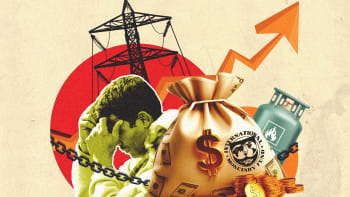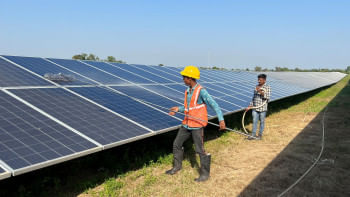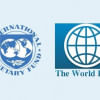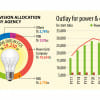The next budget should push for clean and secure energy

Bangladesh's drive to fulfil energy demand, riding on quick-fix strategies and relying on imports, has helped in the short-run but exacerbated the country's financial health. While fixing the problems will require long-term efforts, the upcoming national budget, to be unveiled in June 2024, will provide an opportunity to address some of the key challenges of the energy and power sectors.
The forthcoming national budget could create a renewable energy fund to further stimulate the renewable energy sector's progress, which has seen increased interest on the back of high energy prices and energy security concerns. Additionally, the budget may allocate more to the energy sector, to explore domestic gas resources and reduce reliance on imported liquefied natural gas (LNG).
With fiscal challenges eroding the country's capacity to clear full payments against imported fossil fuels and electricity produced by private power producers in the last couple of years, investment in clean energy is taking centre stage. Other factors, such as high and volatile fossil fuel prices and concerns about energy security, tempted the government to sign contracts with private investors for renewable energy projects of several thousand megawatts (MW) capacity in the last two years.
However, prior experience points to a gloomy picture. Although new renewable energy projects have come online in the last two years, the pace and scale seem slow and inadequate.
Difficulty arranging expensive land, where ownership is fragmented, limits the country's accelerated deployment of renewable energy. Furthermore, private project developers shoulder the cost of long transmission lines, increasing the overall project cost.
Against this backdrop, the Bangladesh government may create a dedicated fund to turbo-charge the renewable energy sector amid the country's heightened exposure to the international fossil fuel market. Allocating through the fiscal year (FY) 2024-25 budget, the government may aim to support at least three areas of renewable energy.
It may cover the transmission costs of selected renewable energy projects. Likewise, it may allocate land to some renewable energy projects through the renewable energy fund, which can support land acquisition costs. Shouldering such costs, the government may introduce reverse auctions in carefully selected projects to reduce tariffs. The government can further utilise the fund to pilot renewable energy projects with battery energy storage systems.
Bangladesh can take inspiration from its past support for private-public-partnership (PPP) projects to create such a fund. Notably, the country allocated Tk 25 billion ($227.5 million) to PPP projects in FY2009-10 to bridge the infrastructure investment gap. This fund included PPP technical assistance worth Tk 1 billion ($9.1 million), a viability gap funding of Tk 3 billion ($27.3 million) and an Infrastructure Investment Fund of Tk 21 billion ($191.1 million).
A similarly bold and landmark ambition, if translated through a budgetary allocation, will help transform the country's energy sector while containing costs and improving reliability.
The Annual Development Plan (ADP) 2023-24 already considered that nine renewable energy projects planned within its framework were "insufficient". Therefore, the ADP, in the upcoming fiscal year, may strategically take up more renewable energy projects. This will be pragmatic as some of the power plants commissioned in the last year or so have not received sufficient gas to operate at their optimum capacities.
As new nuclear facilities will likely be online during FY 2024-25, Bangladesh will have significant baseload capacity. Based on allocation in the forthcoming national budget, the ADP may turn the tide towards renewable energy.
However, Bangladesh continues to allocate more of its budget to the power sector instead of the energy sector. For instance, the Power Division, which takes care of the power sector's development, received around 90 percent of the total budget allocated for Energy and Power Divisions from FY 2016-17 to FY 2022-23. Notably, it received a massive 97.1 percent of the allocated Tk 348.2 billion ($3.17 billion) in FY 2023-24, leaving the Energy Division with a paltry Tk 9.9 billion ($89.5 million).
A decade ago, Bangladesh's lagging power system capacity influenced massive investment in power infrastructure, but the need and outlook appear quite different now. Allocations of hefty budgets to the power sector on a yearly basis have already thrown up several challenges for the Energy and Mineral Resources Division, which has become increasingly import-dependent.
The national budget may consider allocating more funds to the latter to strengthen Bangladesh Petroleum and Exploration Company (BAPEX), to enhance the company's ongoing onshore gas exploration efforts and limit the reliance on imported LNG.
An important step in driving Bangladesh away from fossil fuels towards a renewable energy future is the rationalisation of duties on electric vehicles and renewable energy. Following approval of the budget of FY 2023-24, any individual willing to buy a second personal transport—be it an electric vehicle (EV) or an internal combustion engine (ICE)-based one—needs to pay an environmental surcharge ranging from Tk 25,000 ($228) to Tk 3,50,000 ($3,187). As EVs are environment-friendly, and interested buyers may already have an ICE car, the government should waive this environmental surcharge on EVs.
Furthermore, total tax incidences on EVs at the import stage are 89.2 percent, including a supplementary duty of 20 percent. A similar supplementary duty is also applicable for hybrid cars. As the government envisages reducing 3.39 million tonnes of carbon dioxide (CO2) emissions from the transport sector by 2030, such import duties on EVs will limit the country's ambition. Instead, the government may increase the duties for second ICE cars and channel part of the revenue to build charging stations for electric and hybrid vehicles.
Additionally, rooftop solar accessories are subject to import duties ranging from 11.2 to 58.6 percent. As rooftop solar can help generate clean energy without affecting land, the government may revisit the tax structure and bring it down.
The current reality reinforces the urgency of frontloading efforts for renewables, creating a conducive ecosystem for EVs and reducing demand growth in imported fuels like LNG. By creating a renewable energy fund and increasing budgetary allocation to the energy sector, the upcoming budget can help attract more private capital and improve Bangladesh's overall energy security.
Shafiqul Alam is lead energy analyst for Bangladesh at the Institute for Energy Economics and Financial Analysis (IEEFA).
Views expressed in this article are the author's own.
Follow The Daily Star Opinion on Facebook for the latest opinions, commentaries and analyses by experts and professionals. To contribute your article or letter to The Daily Star Opinion, see our guidelines for submission.

 For all latest news, follow The Daily Star's Google News channel.
For all latest news, follow The Daily Star's Google News channel. 








Comments